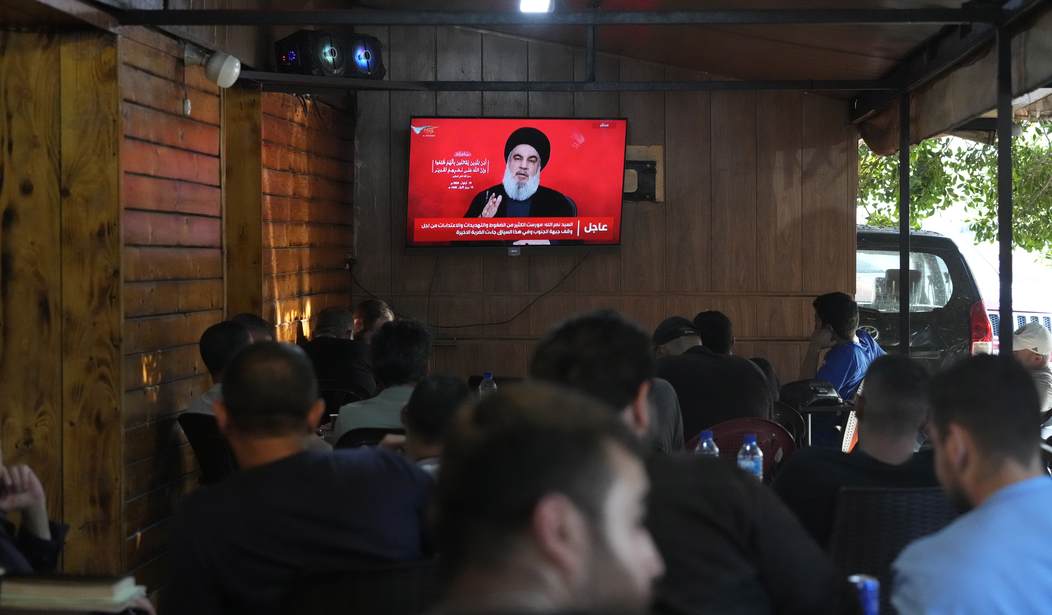An even better question: Why are Hezbollah leaders still meeting in Beirut?
The Israelis launched another massive attack on a building complex "on the outskirts of Beirut," the New York Times reports this morning. This apparently refers to Dahiyeh, the suburb controlled by Hamas Hezbollah [corrected], and where Israelis killed longtime Hezbollah leader Hassan Nasrallah a few days ago. Reportedly, Nasrallah's presumed successor had gathered with what's left of Hezbollah's command, and ... well ...
Israel bombed a meeting of Hezbollah’s senior leadership around midnight on Thursday, a gathering that included Hashem Safieddine, the presumed successor of Hassan Nasrallah, the group’s longtime chief who was assassinated in an airstrike in Lebanon last week, according to three Israeli officials.
The three officials, who spoke on the condition of anonymity to discuss intelligence matters, said Israel had struck an underground bunker belonging to Hezbollah near Beirut, the Lebanese capital. ...
Mr. Safieddine, Mr. Nasrallah’s cousin, is in his 50s and has long been a major player in Hezbollah and has been considered a contender to become the group’s new secretary general. Israeli officials previously told The New York Times that Mr. Safieddine was one of the few senior Hezbollah leaders not present at the site of Israel’s heavy bombardment last Friday near Beirut that killed Mr. Nasrallah.
It was not immediately clear if Mr. Safieddine was present in the bunker struck overnight Friday.
Videos and pictures on Twitter/X show multiple explosions from a distance. Israel had even issued a warning for this specific neighborhood, hoping to clear out civilians before the strike, according to this NYT report. No one knows yet whether Safieddine (sometimes rendered as Safi al-Din) got killed in the blast yet, but it's been a few hours and no one's heard from him yet.
The Israelis are handling this story with caution. For now, the IDF calls this an attack on Hezbollah's intel headquarters:
The IDF said Friday morning that the airstrike in Beirut targeted Hezbollah’s intelligence headquarters. The military did not disclose who was at the underground bunker.
There was no immediate reaction from Hezbollah.
The IDF did claim to have confirmed the death of another high-ranking Hezbollah commander in the strike:
🔴Mohammad Rashid Sakafi, the Commander of Hezbollah’s Communications Unit, during a precise, intelligence-based strike in Beirut yesterday.
— Israel Defense Forces (@IDF) October 4, 2024
Sakafi was a senior Hezbollah terrorist, who was responsible for the communications unit since 2000. Sakafi invested significant efforts… pic.twitter.com/PH65nh5FLI
Sakafi was a senior Hezbollah terrorist, who was responsible for the communications unit since 2000. Sakafi invested significant efforts to develop communication capabilities between all of Hezbollah's units.
Presumably, Safaki would have been a big enough target for the IDF to conduct this raid. But if Safieddine was meeting with Safaki and other commanders in the same bunker at the time of the attack, then this became a Nasrallah-level defeat for Hezbollah, one in a series of such defeats in the span of less than three weeks.
Of course, Safaki might be one reason for Israel's successes in that period. It was Hezbollah's "communications unit" -- telecommunications specifically, the NYT notes -- that created the path for Operation Grim Beeper and the exploding radios the next day. And again, what good is an intel unit that has been so thoroughly compromised and yet can't seem to adjust to that obvious reality? Why in the world would Hezbollah commanders still trust their facilities in Dahiyeh when Israel has repeatedly demonstrated that they know precisely where they are?
Hezbollah built a fearsome reputation as the world's strongest non-state terror network, not to mention one of the largest drug cartels. The last three weeks has shown them to be remarkably incompetent and flabby, almost to the point of wondering whether its leadership samples its own product a little too often.
As for Safieddine, that will take a little time to work out. Bear in mind, though, that if he survived the strike or wasn't there when it happened, Safieddine would speak up as soon as possible to alert Hezbollah's remaining commanders that he's still alive. Just as with Nasrallah, the longer it takes to hear from him, the more likely it becomes that we won't ever hear from him again.








Join the conversation as a VIP Member